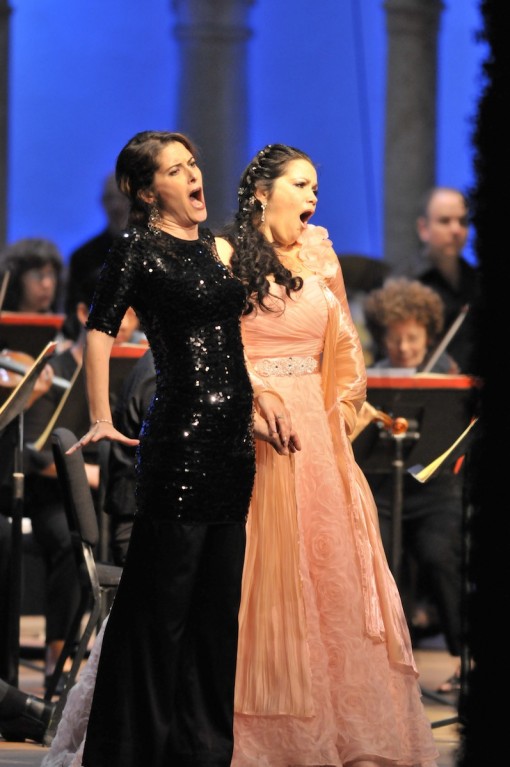Caramoor presents a historically scrupulous yet vocally uneven “Capuleti”

Kate Aldrich, left, and Eglise Gutierrez in Bellini's "I Capuleti e i Montecchi" at Caramoor. Photo: Gabe Palacio
The Bel Canto opera series at the Caramoor Festival, situated on a sprawling country estate near Katonah, New York, is generally one of the high points of the summer opera season in the Northeast. The music director, Will Crutchfield, chooses rarities from 19th-century Italy, presented with scholarly attention to the score and often with excellent casts.
The main attraction of this Caramoor season was a rare staging of Rossini’s early opera Ciro in Babilonia, presented earlier this month in the 200th year after its premiere and featuring the outstanding Polish mezzo-soprano Ewa Podleś. That performance was produced in conjunction with the Rossini Opera Festival, in Pesaro, Italy, where it will travel next month.
By comparison, the second opera, Vincenzo Bellini’s I Capuleti e i Montecchi — performed in Caramoor’s usual semi-staged concert format and heard on Saturday night — was a less starry affair. Still, Bellini’s 1830 take on the classic story of Romeo and Juliet — bearing little relation to the version by William Shakespeare — is enough of a rarity to warrant interest.
Crutchfield performed the opera using the critical edition by Claudio Toscani, which corrects errors and orchestration augmentations that had crept into the score over the centuries. While omitting the rather bland overture, Crutchfield did incorporate one of Bellini’s additions to his Milan revision, a page of music appended to Giulietta’s second-act aria, in slightly modified form. He also used Bellini’s original finale, which was often excised by some Romeos, including the imperious Maria Malibran who replaced it with the more vocally flattering scene composed a few years earlier by Nicola Vaccai for his 1825 opera, Giulietta e Romeo. (The distortion become so standard that the score was published with both finales as alternates.)
As interesting as this textually scrupulous version of the score was, the cast was not ideal. The role of Giulietta requires a lighter soprano with ease and clarity in the far upper range, something that Eglise Gutiérrez did not display Saturday night. Her pianissimo notes were high and soft, but there was not the angelic radiance that the role needs in that range, notably in the dreamy bedroom scene of Act I. Gutiérrez compresses her sound in a sometimes harsh way at the top, with a few minor cracks under pressure. The very high note at the end of Morte io non temo, il sai was brittle and unattractive, and the tightness limited her voice when she needed power the most.
Mezzo-soprano Kate Aldrich got off to a rough start as Romeo, sounding quite strained in the first act, yet ultimately turned in a much stronger performance in the second, with a particularly moving tomb scene. As Tebaldo, Romeo’s rival, tenor Leonardo Capalbo produced a virile tone, though his top notes sounded nasal and his voice weakened in the lower register.
Caramoor Young Artists ably filled out the supporting cast, with a robust Capellio from bass Jeffrey Beruan and a solid Lorenzo from baritone Benjamin Harris. The Caramoor Festival Chorus sounded in good form, careful to follow Crutchfield’s beat even when they sang offstage in the tomb scene. Crutchfield led his forces with a sure hand, with strong ideas about tempos but also the finesse to allow his singers rhythmic freedom, even quickly righting a false entrance in the duet between Romeo and Giulietta in Act I.
Some of the most moving contributions came from the Orchestra of St. Luke’s, in the elegant solos (horn and cello) that introduce the key scenes in this rather simple score. The glossy clarinet solos in Act I, and especially leading into the tomb scene in Act II, deserve special mention for their beauty, a forlorn sound that by itself set the scene of lonely desperation that followed.
Posted Jul 23, 2012 at 9:26 am by Jose Tain
Too bad that you found nothing good to say about the remarkable soprano Eglise Gutierrez. Maybe the next time.
Jose